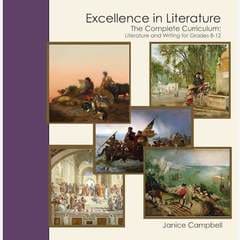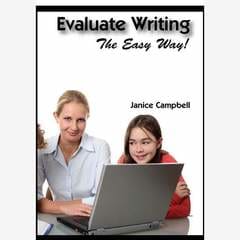You Can Teach Your Child to Write, Part 2
Part 2: Dictation, Composition, and Evaluation
Don't forget to read Part 1!
Dictation Sharpens Writing Mechanics
When the child has gained skill in copying and narration, it is time to begin working with dictation. If you prefer to work with carefully planned and sequenced lessons, there are several good writing curricula such as Imitations in Writing and Language Arts Through Literature that use dictation as a foundation.
Otherwise, you can simply choose a brief verse, rhyme, or quotation from a good book. Have the child study it, then dictate it to him/her. Read each sentence only once to ensure close attention, and allow plenty of time for writing.
When the brief passage has been written, go over the paper with the child and help him to compare the written passage with the original. At first, you may be surprised to discover that the neat, careful handwriting the child has developed has almost completely disappeared!
As the child turns his attention to capturing on paper words he cannot see, he will be distracted from his former focus on careful letter formation. Don't be alarmed — this is normal and with encouragement and practice will soon correct itself.
Continue practice with dictation, increasing the length and difficulty of the dictation pieces until you feel that the child has mastered the skills involved. Once the student is comfortable with dictation, he will be able to use writing as means of communication, not only in birthday lists and captions for his drawings, but also for letters and stories.
If you would like to provide supplemental practice in recognizing and correcting errors in punctuation and grammar, Fix-it Grammar from IEW or the Editor-in-Chief series can be helpful. Older students will be able to refer to a writer's handbook such as the Excellence in Literature Handbook for Writers as they learn to evaluate their own writing.
Composition: Creative and Expository Writing
Next to the doing of things that deserve to be written, there is nothing that gets a man more credit, or gives him more pleasure than to write things that deserve to be read. Pliny the Younger (circa A.D. 62-113)
The essence of writing is to know your subject. David McCullough (1933-)
 Once your child has achieved fluency in copying (penmanship), narration (mental organization, sequencing, word choice), and dictation (spelling, punctuation, proofreading), he is ready to add the skill of composition.
Once your child has achieved fluency in copying (penmanship), narration (mental organization, sequencing, word choice), and dictation (spelling, punctuation, proofreading), he is ready to add the skill of composition.
This is the writing stage in which the student pulls together all the skills he or she has learned, and applies them to either creative or expository writing. Creative writing includes the composition of poetry, stories, and personal essays.
Expository writing includes reports and articles, essays, and other non-fiction writing. The composition stage begins earlier for some children than for others, especially for students who have had extensive narration practice. Most students will be working composition by the middle grades.
The Ben Franklin method
There are many textbooks available for teaching composition, but it is possible for a motivated student to become an excellent writer using what I call the 'Ben Franklin method.' In The Autobiography of Benjamin Franklin, Franklin relates how, after his father pointed out his lack of "elegance of expression," he taught himself to write more elegantly and expressively:"About this time I met with an odd volume of the Spectator - I thought the writing excellent, and wished, if possible, to imitate it. With this view I took some of the papers, and, making short hints of the sentiment in each sentence laid them by a few days, and then, without looking at the book, try'd to compleat the papers again, by expressing each hinted sentiment at length, and as fully as it had been expressed before, in any suitable words that should come hand.
Then I compared my Spectator with the original, discovered some of my faults, and corrected them. But I found I wanted a stock of words, or a readiness in recollecting and using them. Therefore I took some of the tales and turned then into verse; and, after a time, when I had pretty well forgotten the prose, turned them back again.
I also sometimes jumbled my collections of hints into confusion, and after some weeks endeavored to reduce them into the best order, before I began to form the full sentences and compleat the paper.
This was to teach me method in the arrangement of thoughts. By comparing my work afterwards with the original, I discovered many faults and amended them; but I sometimes had the pleasure of fancying that, in certain particulars of small import, I had been lucky enough to improve the method or the language" (35).Franklin apparently pursued his self-education in writing during his early teens, and this is a reasonable age for students with a strong foundation in reading and dictation to begin working with more challenging assignments. You can read more about it on Excellence in Literature. There are several points to remember when teaching the composition stage of writing:
- It is not a speedy process — a completed composition sequence includes establishing a topic, gathering and organizing information, creating a rough draft, evaluating and improving the rough draft, and presentation of a final draft;
- Much of the writing process is mental — leave time for brainstorming and mental organization of ideas;
- Work with the student's natural learning style — some students enjoy visual organizing methods such as mind maps, others like the structure of an outline, and some prefer to do most of the pre-writing process mentally;
- It is not necessary to go through the entire composition sequence with every assignment, particularly if the student is writing frequently for other class work;
- Integrate writing lessons with other subjects by using the composition sequence for history, literature, or science topics;
- Be sure to use resources with models (samples) of the types of papers assigned (the Excellence in Literature curriculum and writer's handbook both contain models)
- Early composition assignments should be brief — don't spring a five-page essay assignment on a student who is accustomed to dictation of no more than a page at a time;
- The writing process can be made less painful for reluctant writers by permitting them to choose topics they find interesting;
- A rich vocabulary is best developed through reading good literature, but extra instruction can be useful. Dynamic Literacy's WordBuild is an excellent vocabulary resource.
Evaluating Writing Assignments
Vigorous writing is concise. A sentence should contain no unnecessary words, a paragraph no unnecessary sentences, for the same reason that a drawing should have no unnecessary lines and a machine no unnecessary parts. This requires not that that the writer make all his sentences short, or that he avoid all detail and treat his subjects only in outline, but that every word tell. William Strunk, Jr. (1869-1946) From The Elements of Style.

The evaluation process is very important in helping the student learn to write. Constructive, consistent feedback helps students understand what is expected and how to achieve it.
I recommend using a writer's handbook such as the Excellence in Literature Handbook for Writers (for older students) or Writer's Inc. (for younger students) and age-appropriate rubrics to evaluate writing and to help develop self-editing skills.
Evaluate Writing the Easy Way is a short (32 pages) little booklet that teaches basic evaluation skills. Parents can improve their evaluation skills by reading extensively and referring to a writer's handbook for any questions of grammar, style, and usage.
If you are not comfortable with your skill in evaluation, you may be able to find another homeschool mom or a friendly English major to evaluate your student's work and provide feedback. Ben Franklin apparently evaluated his own writing, using published writing as a standard of comparison, and students can learn to do that too.
Students raised on model-based writing practices such as copywork understand that it is wise to begin a writing project by studying a model of the type of paper that is expected. It is simply common sense that a student who can see examples of a compare/contrast essay, for example, will be much better able to write one than a student who has not studied a model.
The more a student reads, the better he or she will write, no matter what the form. You can also seize the opportunity to improve your own skills, and learn to discern good writing by reading books such as On Writing Well by William Zinsser and Elements of Style
by William Strunk and E.B. White.
Writing is the most permanent form of communication, and when you take the time to improve your own skills, you demonstrate to your students that you believe writing is important. (As always, Amazon links are affiliate links — full disclosure in the footer).
Input before output
The man who does not read good books has no advantage over the man who can’t read them.
Finally, remember that the process of teaching writing does not begin with composition, but with reading. Without adequate input — stories, poetry, essays, fiction, nonfiction — all of it, a student cannot be expected to produce quality output. In order to avoid frustrating students and causing them to feel that they hate writing, you must provide- an abundance of mental nourishment in the form of literature, both good and great (more articles on reading at my DoingWhatMatters.com blog)
- plenty of practice with the mechanical skills of penmanship, copying, narration, and dictation (more articles on writing at my DoingWhatMatters.com blog)
- plenty of time for the development and organization of ideas
It is just as difficult to wring water from a dry sponge as it is to extract meaningful writing from a child who has not been saturated in the written word. As a homeschool parent, you have the opportunity to gently shepherd your child into a world of literary delight as you teach your child to write, so relax and enjoy the process. You can do it!
Be sure to visit our shop where you can see Excellence in Literature, the EIL Handbook for Writers (an indispensable guide to writing), Evaluate Writing the Easy Way, and more.